Orientation for Success: Reflective Approach to Learning Essay
VerifiedAdded on 2023/06/08
|9
|1930
|101
Essay
AI Summary
This essay delves into the significance of reflective learning within the context of business and management, emphasizing the development of critical thinking skills through self-analysis and improvement strategies. The report explores the Gibbs model of reflection, detailing its application in understanding and evaluating experiences. It also examines the nature of feedback and feedforward mechanisms, highlighting their role in enhancing both formative and summative assessments. The essay provides a comprehensive overview of how a reflective approach, coupled with effective feedback, can significantly improve future performance and learning outcomes, ultimately contributing to enhanced academic success. The essay also includes the application of the Gibbs model, the nature of feedback and feedforward, and how the reflective approach can enhance future assessments.
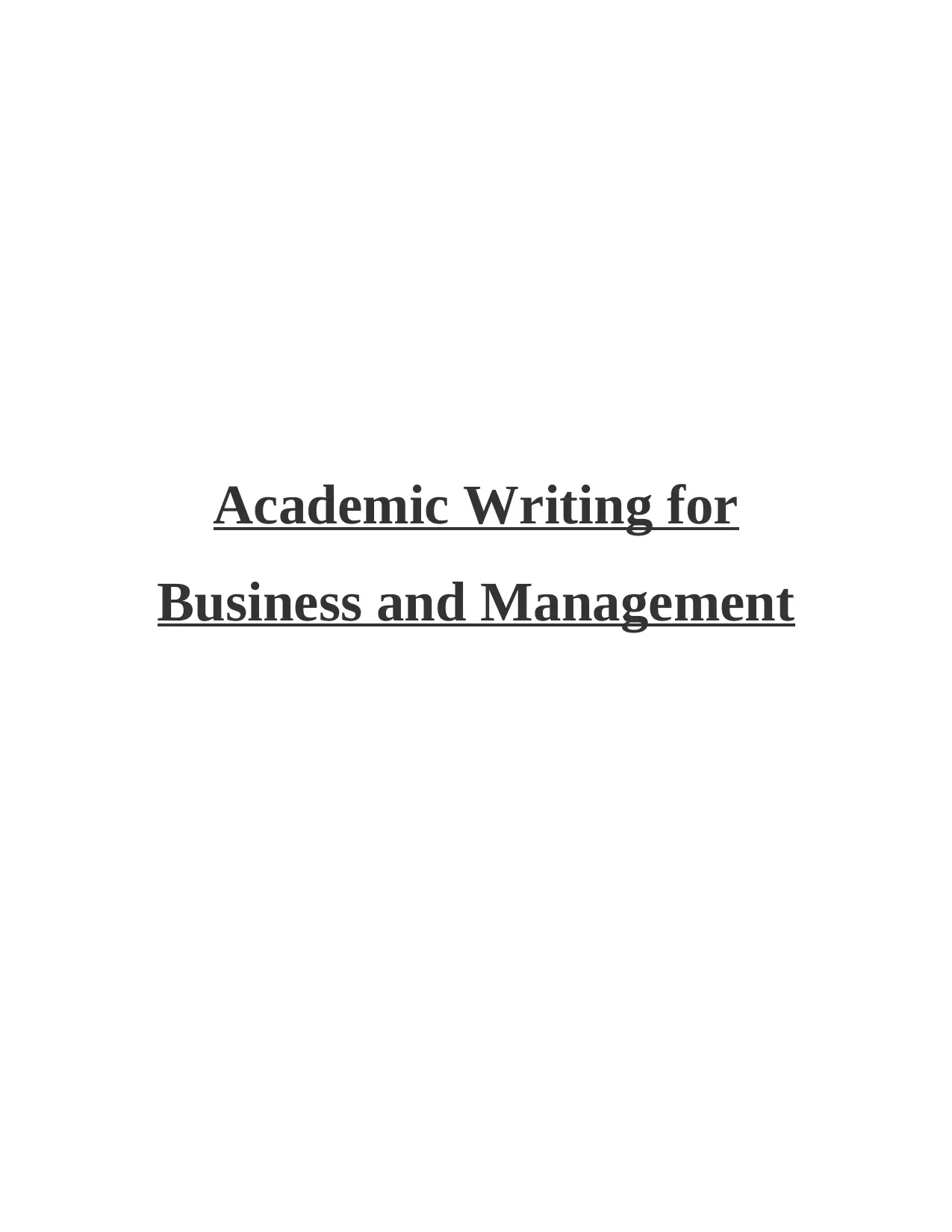
Academic Writing for
Business and Management
Business and Management
Paraphrase This Document
Need a fresh take? Get an instant paraphrase of this document with our AI Paraphraser
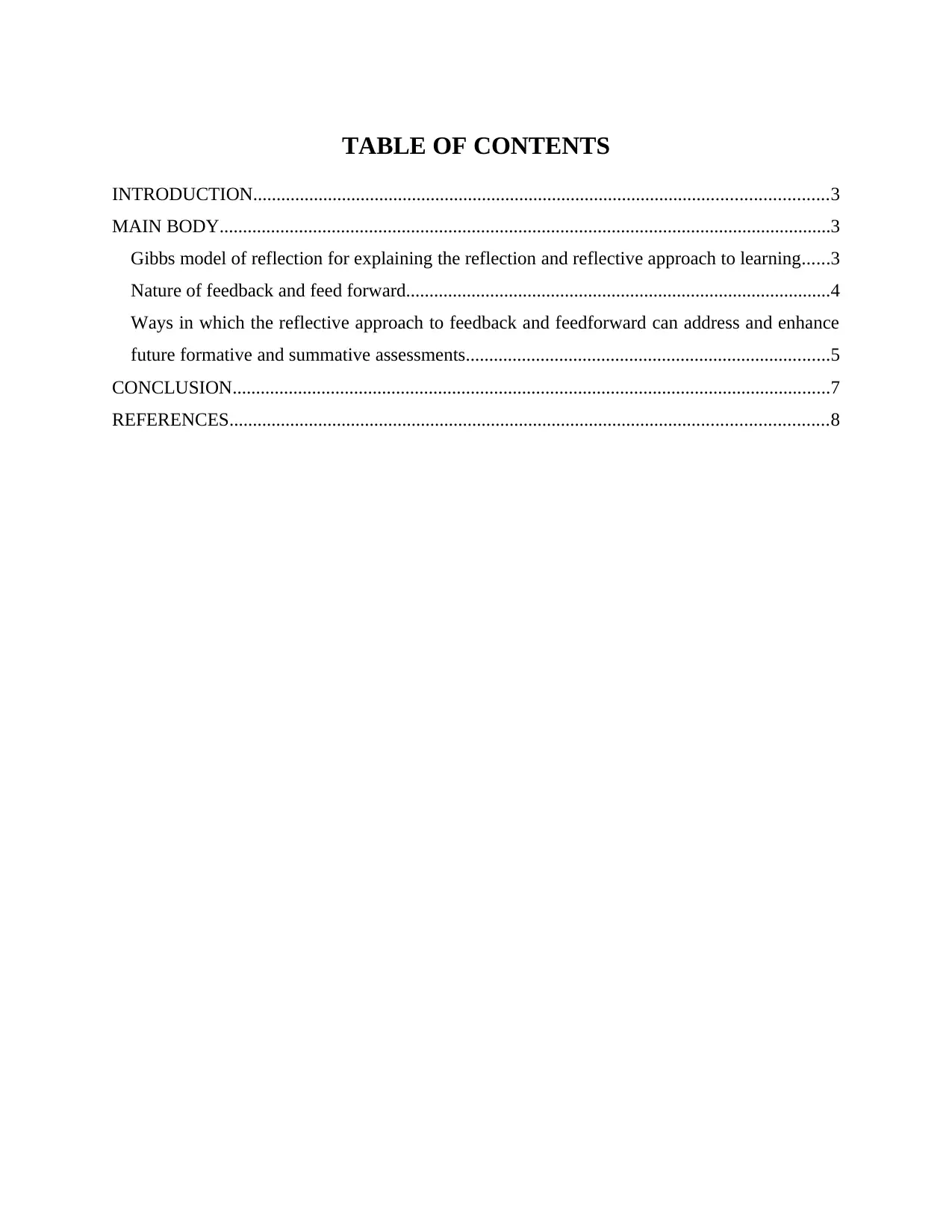
TABLE OF CONTENTS
INTRODUCTION...........................................................................................................................3
MAIN BODY...................................................................................................................................3
Gibbs model of reflection for explaining the reflection and reflective approach to learning......3
Nature of feedback and feed forward...........................................................................................4
Ways in which the reflective approach to feedback and feedforward can address and enhance
future formative and summative assessments..............................................................................5
CONCLUSION................................................................................................................................7
REFERENCES................................................................................................................................8
INTRODUCTION...........................................................................................................................3
MAIN BODY...................................................................................................................................3
Gibbs model of reflection for explaining the reflection and reflective approach to learning......3
Nature of feedback and feed forward...........................................................................................4
Ways in which the reflective approach to feedback and feedforward can address and enhance
future formative and summative assessments..............................................................................5
CONCLUSION................................................................................................................................7
REFERENCES................................................................................................................................8
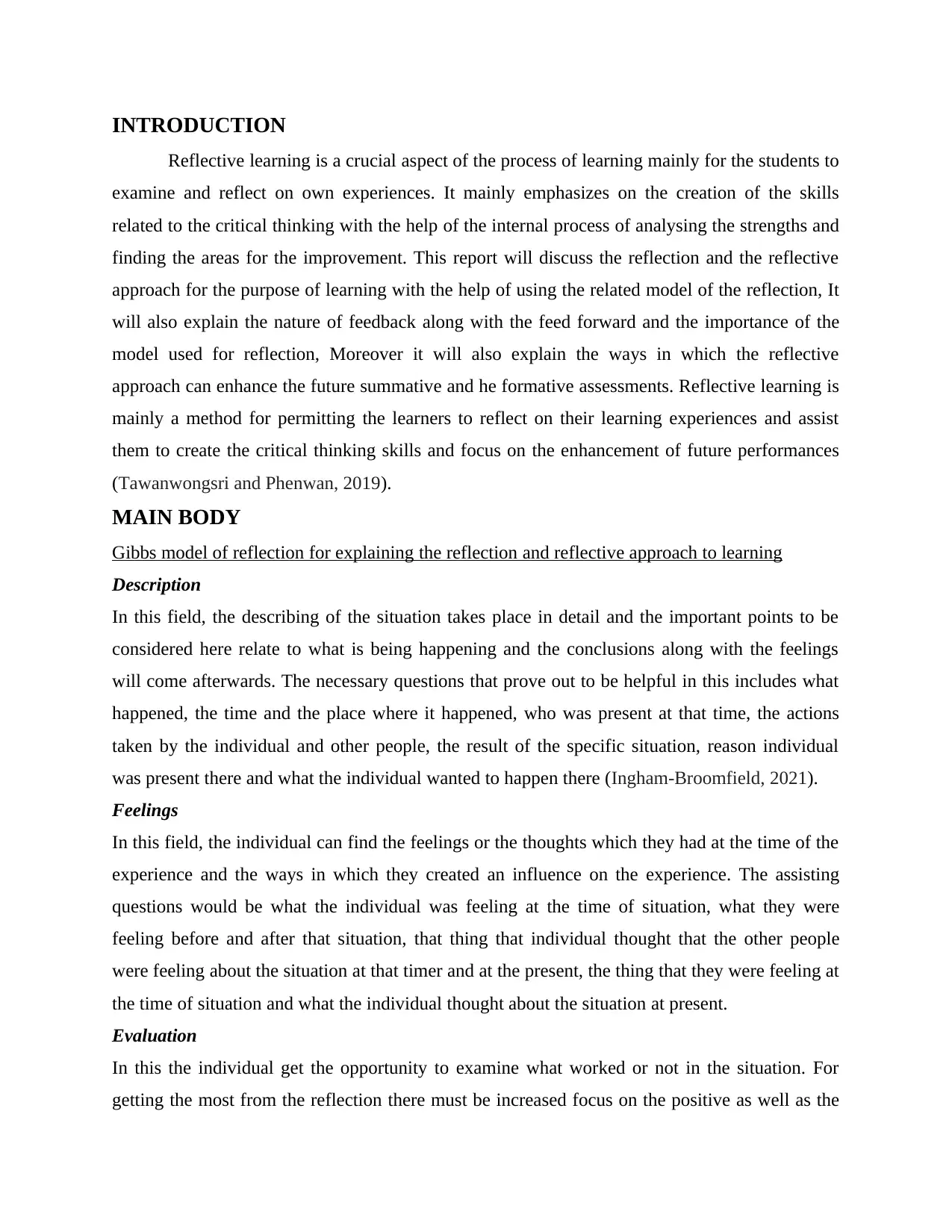
INTRODUCTION
Reflective learning is a crucial aspect of the process of learning mainly for the students to
examine and reflect on own experiences. It mainly emphasizes on the creation of the skills
related to the critical thinking with the help of the internal process of analysing the strengths and
finding the areas for the improvement. This report will discuss the reflection and the reflective
approach for the purpose of learning with the help of using the related model of the reflection, It
will also explain the nature of feedback along with the feed forward and the importance of the
model used for reflection, Moreover it will also explain the ways in which the reflective
approach can enhance the future summative and he formative assessments. Reflective learning is
mainly a method for permitting the learners to reflect on their learning experiences and assist
them to create the critical thinking skills and focus on the enhancement of future performances
(Tawanwongsri and Phenwan, 2019).
MAIN BODY
Gibbs model of reflection for explaining the reflection and reflective approach to learning
Description
In this field, the describing of the situation takes place in detail and the important points to be
considered here relate to what is being happening and the conclusions along with the feelings
will come afterwards. The necessary questions that prove out to be helpful in this includes what
happened, the time and the place where it happened, who was present at that time, the actions
taken by the individual and other people, the result of the specific situation, reason individual
was present there and what the individual wanted to happen there (Ingham-Broomfield, 2021).
Feelings
In this field, the individual can find the feelings or the thoughts which they had at the time of the
experience and the ways in which they created an influence on the experience. The assisting
questions would be what the individual was feeling at the time of situation, what they were
feeling before and after that situation, that thing that individual thought that the other people
were feeling about the situation at that timer and at the present, the thing that they were feeling at
the time of situation and what the individual thought about the situation at present.
Evaluation
In this the individual get the opportunity to examine what worked or not in the situation. For
getting the most from the reflection there must be increased focus on the positive as well as the
Reflective learning is a crucial aspect of the process of learning mainly for the students to
examine and reflect on own experiences. It mainly emphasizes on the creation of the skills
related to the critical thinking with the help of the internal process of analysing the strengths and
finding the areas for the improvement. This report will discuss the reflection and the reflective
approach for the purpose of learning with the help of using the related model of the reflection, It
will also explain the nature of feedback along with the feed forward and the importance of the
model used for reflection, Moreover it will also explain the ways in which the reflective
approach can enhance the future summative and he formative assessments. Reflective learning is
mainly a method for permitting the learners to reflect on their learning experiences and assist
them to create the critical thinking skills and focus on the enhancement of future performances
(Tawanwongsri and Phenwan, 2019).
MAIN BODY
Gibbs model of reflection for explaining the reflection and reflective approach to learning
Description
In this field, the describing of the situation takes place in detail and the important points to be
considered here relate to what is being happening and the conclusions along with the feelings
will come afterwards. The necessary questions that prove out to be helpful in this includes what
happened, the time and the place where it happened, who was present at that time, the actions
taken by the individual and other people, the result of the specific situation, reason individual
was present there and what the individual wanted to happen there (Ingham-Broomfield, 2021).
Feelings
In this field, the individual can find the feelings or the thoughts which they had at the time of the
experience and the ways in which they created an influence on the experience. The assisting
questions would be what the individual was feeling at the time of situation, what they were
feeling before and after that situation, that thing that individual thought that the other people
were feeling about the situation at that timer and at the present, the thing that they were feeling at
the time of situation and what the individual thought about the situation at present.
Evaluation
In this the individual get the opportunity to examine what worked or not in the situation. For
getting the most from the reflection there must be increased focus on the positive as well as the
⊘ This is a preview!⊘
Do you want full access?
Subscribe today to unlock all pages.

Trusted by 1+ million students worldwide
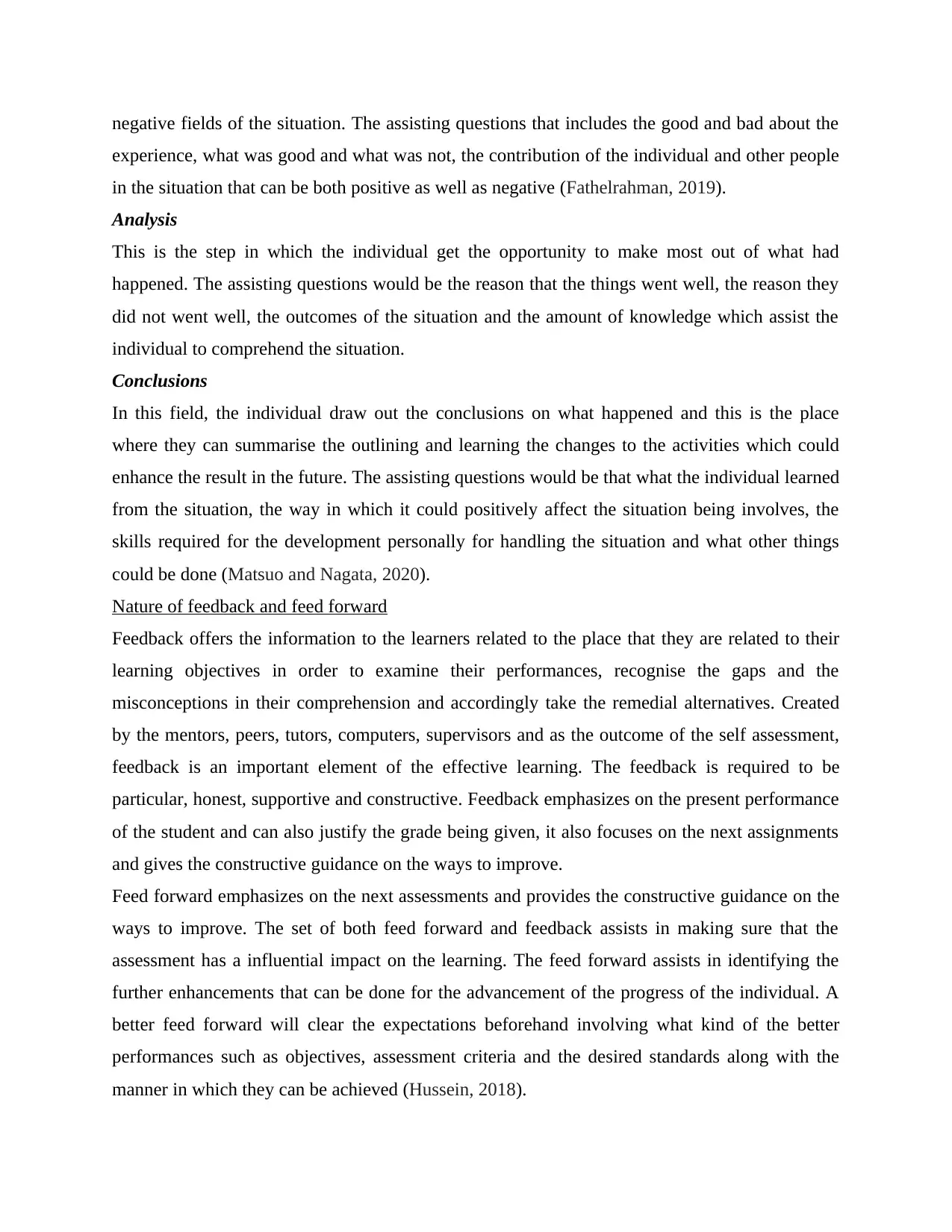
negative fields of the situation. The assisting questions that includes the good and bad about the
experience, what was good and what was not, the contribution of the individual and other people
in the situation that can be both positive as well as negative (Fathelrahman, 2019).
Analysis
This is the step in which the individual get the opportunity to make most out of what had
happened. The assisting questions would be the reason that the things went well, the reason they
did not went well, the outcomes of the situation and the amount of knowledge which assist the
individual to comprehend the situation.
Conclusions
In this field, the individual draw out the conclusions on what happened and this is the place
where they can summarise the outlining and learning the changes to the activities which could
enhance the result in the future. The assisting questions would be that what the individual learned
from the situation, the way in which it could positively affect the situation being involves, the
skills required for the development personally for handling the situation and what other things
could be done (Matsuo and Nagata, 2020).
Nature of feedback and feed forward
Feedback offers the information to the learners related to the place that they are related to their
learning objectives in order to examine their performances, recognise the gaps and the
misconceptions in their comprehension and accordingly take the remedial alternatives. Created
by the mentors, peers, tutors, computers, supervisors and as the outcome of the self assessment,
feedback is an important element of the effective learning. The feedback is required to be
particular, honest, supportive and constructive. Feedback emphasizes on the present performance
of the student and can also justify the grade being given, it also focuses on the next assignments
and gives the constructive guidance on the ways to improve.
Feed forward emphasizes on the next assessments and provides the constructive guidance on the
ways to improve. The set of both feed forward and feedback assists in making sure that the
assessment has a influential impact on the learning. The feed forward assists in identifying the
further enhancements that can be done for the advancement of the progress of the individual. A
better feed forward will clear the expectations beforehand involving what kind of the better
performances such as objectives, assessment criteria and the desired standards along with the
manner in which they can be achieved (Hussein, 2018).
experience, what was good and what was not, the contribution of the individual and other people
in the situation that can be both positive as well as negative (Fathelrahman, 2019).
Analysis
This is the step in which the individual get the opportunity to make most out of what had
happened. The assisting questions would be the reason that the things went well, the reason they
did not went well, the outcomes of the situation and the amount of knowledge which assist the
individual to comprehend the situation.
Conclusions
In this field, the individual draw out the conclusions on what happened and this is the place
where they can summarise the outlining and learning the changes to the activities which could
enhance the result in the future. The assisting questions would be that what the individual learned
from the situation, the way in which it could positively affect the situation being involves, the
skills required for the development personally for handling the situation and what other things
could be done (Matsuo and Nagata, 2020).
Nature of feedback and feed forward
Feedback offers the information to the learners related to the place that they are related to their
learning objectives in order to examine their performances, recognise the gaps and the
misconceptions in their comprehension and accordingly take the remedial alternatives. Created
by the mentors, peers, tutors, computers, supervisors and as the outcome of the self assessment,
feedback is an important element of the effective learning. The feedback is required to be
particular, honest, supportive and constructive. Feedback emphasizes on the present performance
of the student and can also justify the grade being given, it also focuses on the next assignments
and gives the constructive guidance on the ways to improve.
Feed forward emphasizes on the next assessments and provides the constructive guidance on the
ways to improve. The set of both feed forward and feedback assists in making sure that the
assessment has a influential impact on the learning. The feed forward assists in identifying the
further enhancements that can be done for the advancement of the progress of the individual. A
better feed forward will clear the expectations beforehand involving what kind of the better
performances such as objectives, assessment criteria and the desired standards along with the
manner in which they can be achieved (Hussein, 2018).
Paraphrase This Document
Need a fresh take? Get an instant paraphrase of this document with our AI Paraphraser
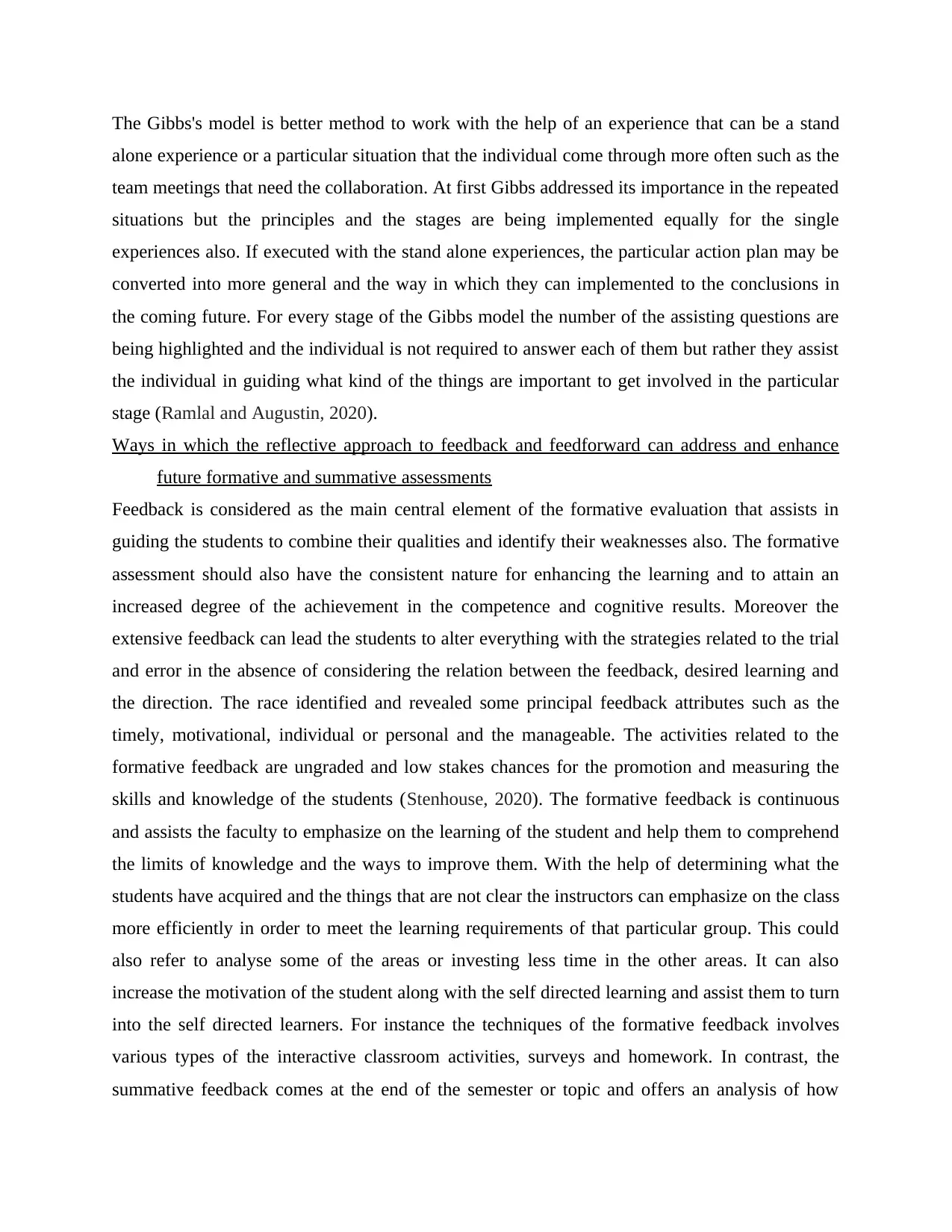
The Gibbs's model is better method to work with the help of an experience that can be a stand
alone experience or a particular situation that the individual come through more often such as the
team meetings that need the collaboration. At first Gibbs addressed its importance in the repeated
situations but the principles and the stages are being implemented equally for the single
experiences also. If executed with the stand alone experiences, the particular action plan may be
converted into more general and the way in which they can implemented to the conclusions in
the coming future. For every stage of the Gibbs model the number of the assisting questions are
being highlighted and the individual is not required to answer each of them but rather they assist
the individual in guiding what kind of the things are important to get involved in the particular
stage (Ramlal and Augustin, 2020).
Ways in which the reflective approach to feedback and feedforward can address and enhance
future formative and summative assessments
Feedback is considered as the main central element of the formative evaluation that assists in
guiding the students to combine their qualities and identify their weaknesses also. The formative
assessment should also have the consistent nature for enhancing the learning and to attain an
increased degree of the achievement in the competence and cognitive results. Moreover the
extensive feedback can lead the students to alter everything with the strategies related to the trial
and error in the absence of considering the relation between the feedback, desired learning and
the direction. The race identified and revealed some principal feedback attributes such as the
timely, motivational, individual or personal and the manageable. The activities related to the
formative feedback are ungraded and low stakes chances for the promotion and measuring the
skills and knowledge of the students (Stenhouse, 2020). The formative feedback is continuous
and assists the faculty to emphasize on the learning of the student and help them to comprehend
the limits of knowledge and the ways to improve them. With the help of determining what the
students have acquired and the things that are not clear the instructors can emphasize on the class
more efficiently in order to meet the learning requirements of that particular group. This could
also refer to analyse some of the areas or investing less time in the other areas. It can also
increase the motivation of the student along with the self directed learning and assist them to turn
into the self directed learners. For instance the techniques of the formative feedback involves
various types of the interactive classroom activities, surveys and homework. In contrast, the
summative feedback comes at the end of the semester or topic and offers an analysis of how
alone experience or a particular situation that the individual come through more often such as the
team meetings that need the collaboration. At first Gibbs addressed its importance in the repeated
situations but the principles and the stages are being implemented equally for the single
experiences also. If executed with the stand alone experiences, the particular action plan may be
converted into more general and the way in which they can implemented to the conclusions in
the coming future. For every stage of the Gibbs model the number of the assisting questions are
being highlighted and the individual is not required to answer each of them but rather they assist
the individual in guiding what kind of the things are important to get involved in the particular
stage (Ramlal and Augustin, 2020).
Ways in which the reflective approach to feedback and feedforward can address and enhance
future formative and summative assessments
Feedback is considered as the main central element of the formative evaluation that assists in
guiding the students to combine their qualities and identify their weaknesses also. The formative
assessment should also have the consistent nature for enhancing the learning and to attain an
increased degree of the achievement in the competence and cognitive results. Moreover the
extensive feedback can lead the students to alter everything with the strategies related to the trial
and error in the absence of considering the relation between the feedback, desired learning and
the direction. The race identified and revealed some principal feedback attributes such as the
timely, motivational, individual or personal and the manageable. The activities related to the
formative feedback are ungraded and low stakes chances for the promotion and measuring the
skills and knowledge of the students (Stenhouse, 2020). The formative feedback is continuous
and assists the faculty to emphasize on the learning of the student and help them to comprehend
the limits of knowledge and the ways to improve them. With the help of determining what the
students have acquired and the things that are not clear the instructors can emphasize on the class
more efficiently in order to meet the learning requirements of that particular group. This could
also refer to analyse some of the areas or investing less time in the other areas. It can also
increase the motivation of the student along with the self directed learning and assist them to turn
into the self directed learners. For instance the techniques of the formative feedback involves
various types of the interactive classroom activities, surveys and homework. In contrast, the
summative feedback comes at the end of the semester or topic and offers an analysis of how
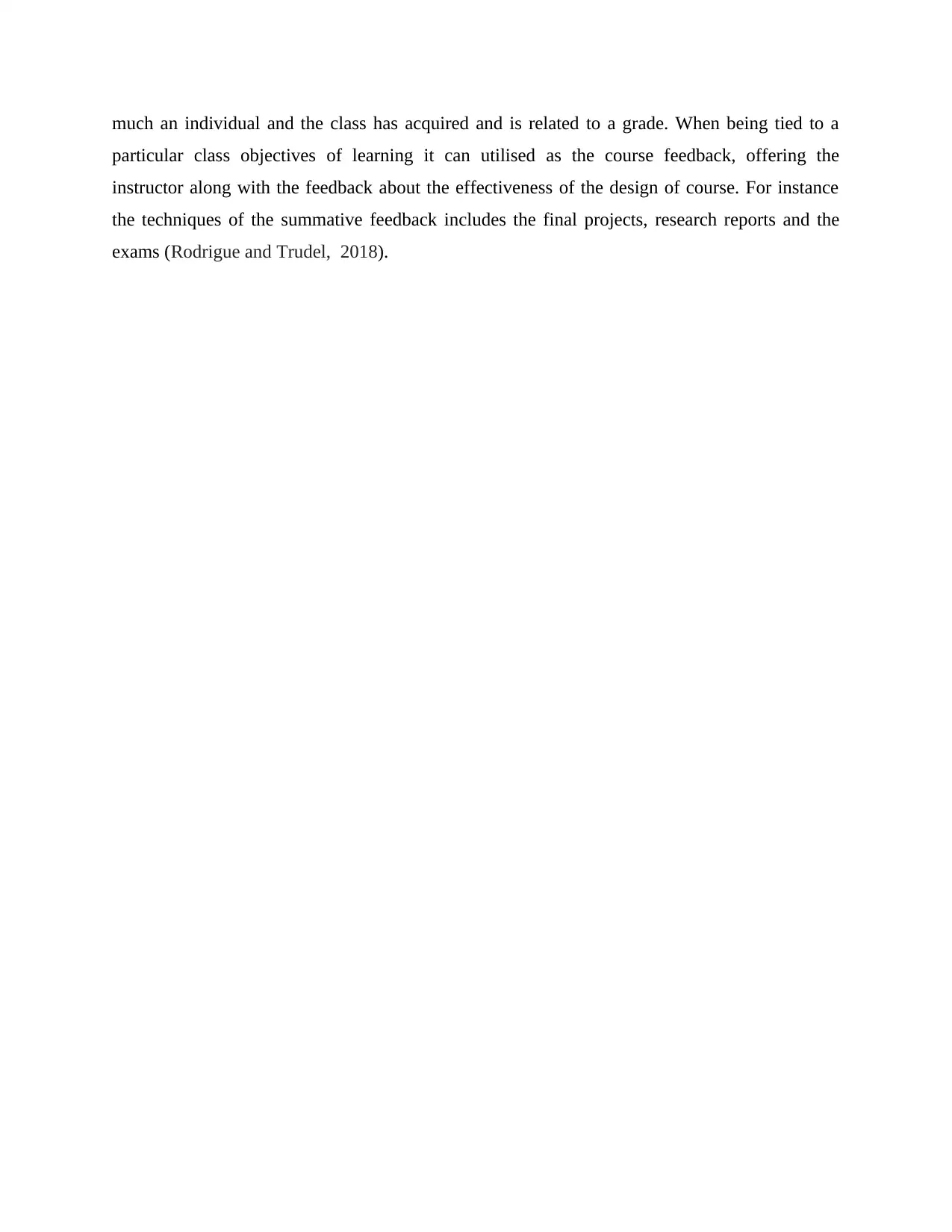
much an individual and the class has acquired and is related to a grade. When being tied to a
particular class objectives of learning it can utilised as the course feedback, offering the
instructor along with the feedback about the effectiveness of the design of course. For instance
the techniques of the summative feedback includes the final projects, research reports and the
exams (Rodrigue and Trudel, 2018).
particular class objectives of learning it can utilised as the course feedback, offering the
instructor along with the feedback about the effectiveness of the design of course. For instance
the techniques of the summative feedback includes the final projects, research reports and the
exams (Rodrigue and Trudel, 2018).
⊘ This is a preview!⊘
Do you want full access?
Subscribe today to unlock all pages.

Trusted by 1+ million students worldwide
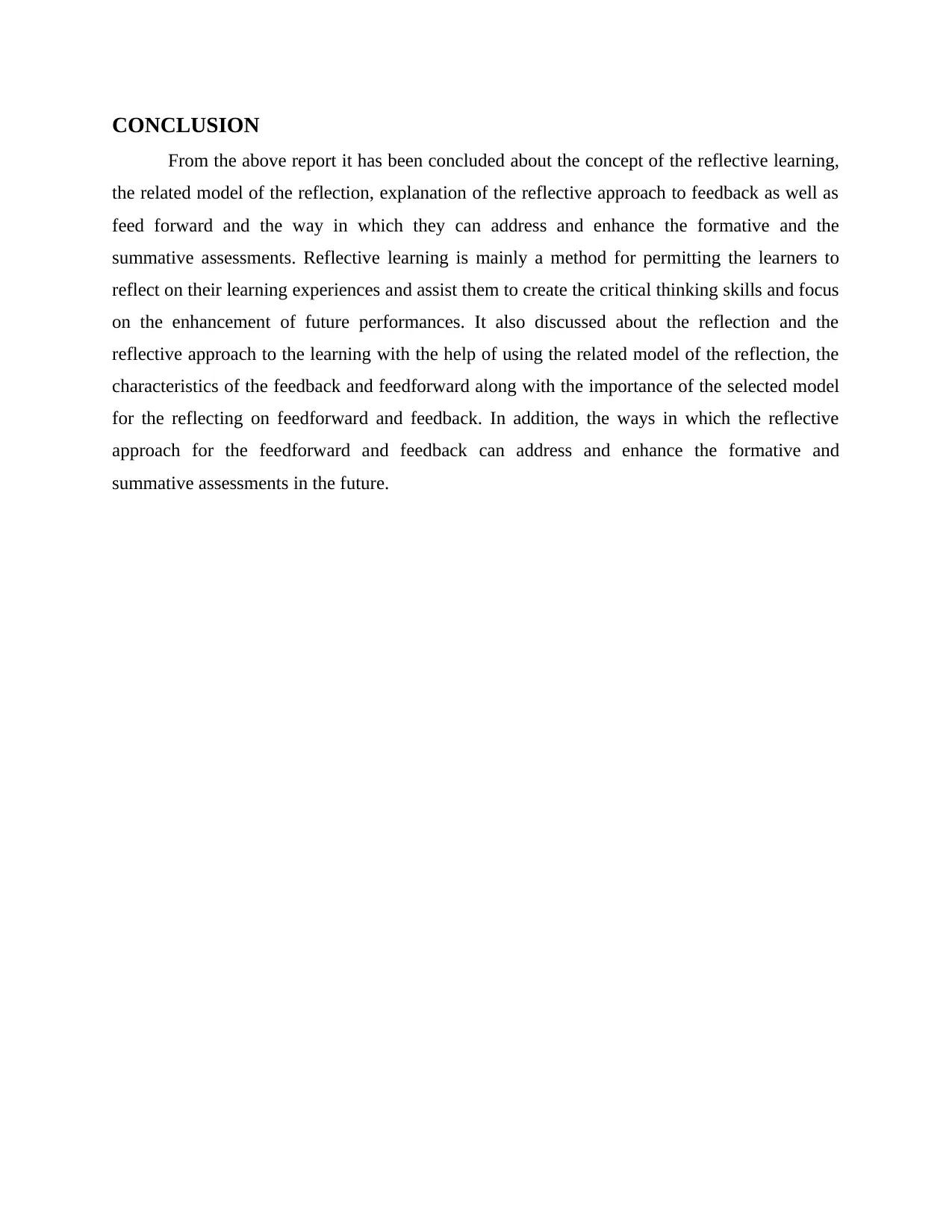
CONCLUSION
From the above report it has been concluded about the concept of the reflective learning,
the related model of the reflection, explanation of the reflective approach to feedback as well as
feed forward and the way in which they can address and enhance the formative and the
summative assessments. Reflective learning is mainly a method for permitting the learners to
reflect on their learning experiences and assist them to create the critical thinking skills and focus
on the enhancement of future performances. It also discussed about the reflection and the
reflective approach to the learning with the help of using the related model of the reflection, the
characteristics of the feedback and feedforward along with the importance of the selected model
for the reflecting on feedforward and feedback. In addition, the ways in which the reflective
approach for the feedforward and feedback can address and enhance the formative and
summative assessments in the future.
From the above report it has been concluded about the concept of the reflective learning,
the related model of the reflection, explanation of the reflective approach to feedback as well as
feed forward and the way in which they can address and enhance the formative and the
summative assessments. Reflective learning is mainly a method for permitting the learners to
reflect on their learning experiences and assist them to create the critical thinking skills and focus
on the enhancement of future performances. It also discussed about the reflection and the
reflective approach to the learning with the help of using the related model of the reflection, the
characteristics of the feedback and feedforward along with the importance of the selected model
for the reflecting on feedforward and feedback. In addition, the ways in which the reflective
approach for the feedforward and feedback can address and enhance the formative and
summative assessments in the future.
Paraphrase This Document
Need a fresh take? Get an instant paraphrase of this document with our AI Paraphraser
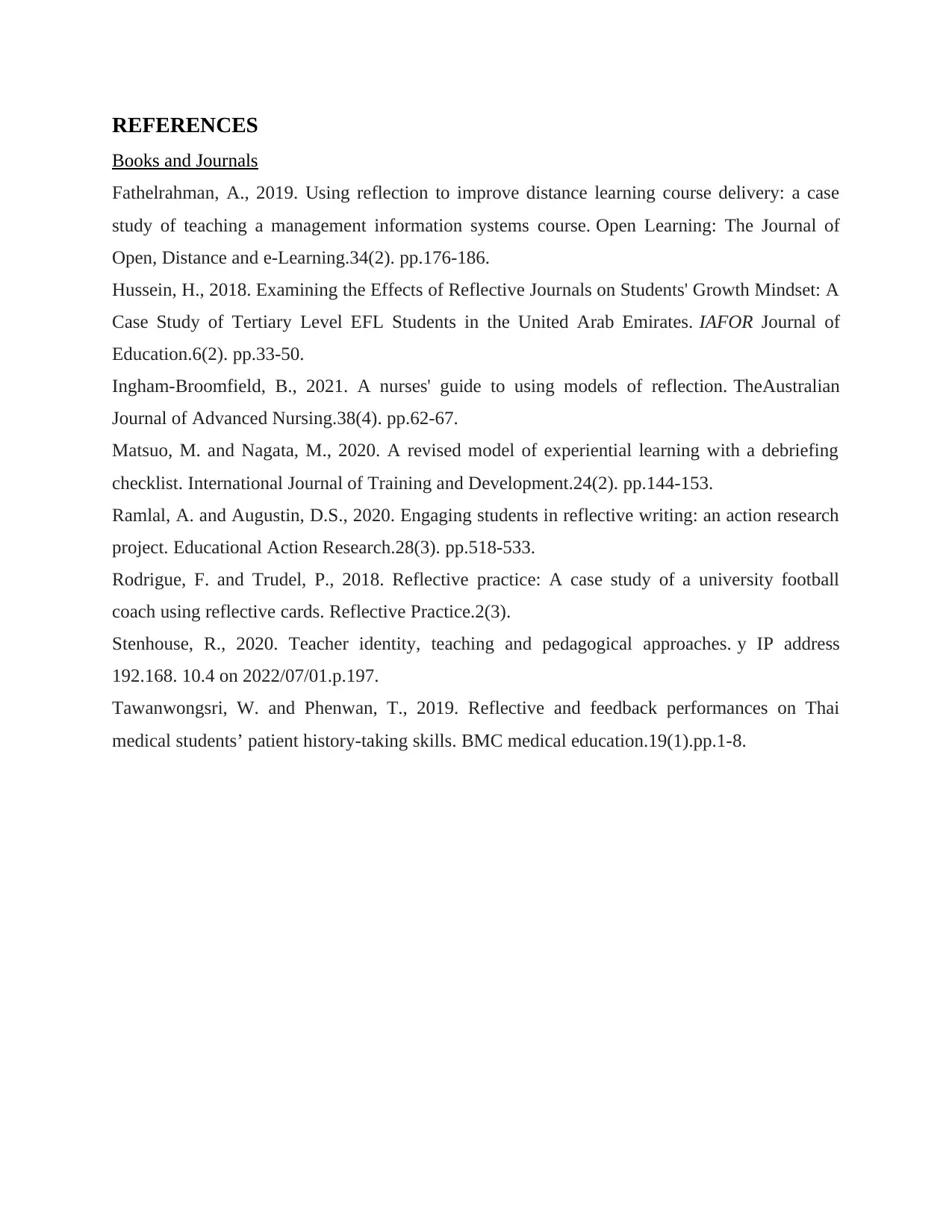
REFERENCES
Books and Journals
Fathelrahman, A., 2019. Using reflection to improve distance learning course delivery: a case
study of teaching a management information systems course. Open Learning: The Journal of
Open, Distance and e-Learning.34(2). pp.176-186.
Hussein, H., 2018. Examining the Effects of Reflective Journals on Students' Growth Mindset: A
Case Study of Tertiary Level EFL Students in the United Arab Emirates. IAFOR Journal of
Education.6(2). pp.33-50.
Ingham-Broomfield, B., 2021. A nurses' guide to using models of reflection. TheAustralian
Journal of Advanced Nursing.38(4). pp.62-67.
Matsuo, M. and Nagata, M., 2020. A revised model of experiential learning with a debriefing
checklist. International Journal of Training and Development.24(2). pp.144-153.
Ramlal, A. and Augustin, D.S., 2020. Engaging students in reflective writing: an action research
project. Educational Action Research.28(3). pp.518-533.
Rodrigue, F. and Trudel, P., 2018. Reflective practice: A case study of a university football
coach using reflective cards. Reflective Practice.2(3).
Stenhouse, R., 2020. Teacher identity, teaching and pedagogical approaches. y IP address
192.168. 10.4 on 2022/07/01.p.197.
Tawanwongsri, W. and Phenwan, T., 2019. Reflective and feedback performances on Thai
medical students’ patient history-taking skills. BMC medical education.19(1).pp.1-8.
Books and Journals
Fathelrahman, A., 2019. Using reflection to improve distance learning course delivery: a case
study of teaching a management information systems course. Open Learning: The Journal of
Open, Distance and e-Learning.34(2). pp.176-186.
Hussein, H., 2018. Examining the Effects of Reflective Journals on Students' Growth Mindset: A
Case Study of Tertiary Level EFL Students in the United Arab Emirates. IAFOR Journal of
Education.6(2). pp.33-50.
Ingham-Broomfield, B., 2021. A nurses' guide to using models of reflection. TheAustralian
Journal of Advanced Nursing.38(4). pp.62-67.
Matsuo, M. and Nagata, M., 2020. A revised model of experiential learning with a debriefing
checklist. International Journal of Training and Development.24(2). pp.144-153.
Ramlal, A. and Augustin, D.S., 2020. Engaging students in reflective writing: an action research
project. Educational Action Research.28(3). pp.518-533.
Rodrigue, F. and Trudel, P., 2018. Reflective practice: A case study of a university football
coach using reflective cards. Reflective Practice.2(3).
Stenhouse, R., 2020. Teacher identity, teaching and pedagogical approaches. y IP address
192.168. 10.4 on 2022/07/01.p.197.
Tawanwongsri, W. and Phenwan, T., 2019. Reflective and feedback performances on Thai
medical students’ patient history-taking skills. BMC medical education.19(1).pp.1-8.

⊘ This is a preview!⊘
Do you want full access?
Subscribe today to unlock all pages.

Trusted by 1+ million students worldwide
1 out of 9
Related Documents
Your All-in-One AI-Powered Toolkit for Academic Success.
+13062052269
info@desklib.com
Available 24*7 on WhatsApp / Email
![[object Object]](/_next/static/media/star-bottom.7253800d.svg)
Unlock your academic potential
Copyright © 2020–2025 A2Z Services. All Rights Reserved. Developed and managed by ZUCOL.





